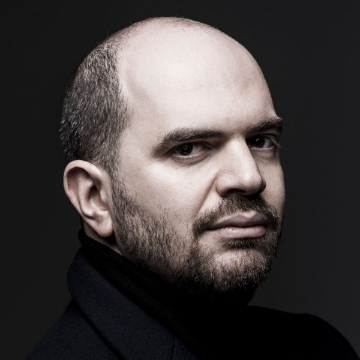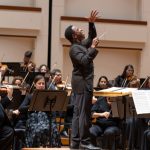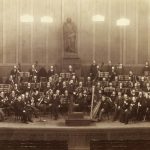May 29 & 31, 2025
Atlanta Symphony Hall, Woodruff Arts Center
Atlanta, Georgia – USA
Atlanta Symphony Orchestra; Stéphane Denève, conductor; Kirill Gerstein, piano.
Jaques IBERT: Escales (1922)
Maurice RAVEL: Piano Concerto for the Left Hand (1929-1930)
Darius MILHAUD: La création du monde, Op. 81 (1923)
George GERSHWIN: An American in Paris (1928)
Mark Gresham | 31 MAY 2025
Paris in the 1920s was a glittering hub of artistic ferment—a heady mix of jazz, modernism, and transatlantic influence. On Thursday night at Atlanta Symphony Hall, guest conductor Stéphane Denève and the Atlanta Symphony Orchestra invited listeners to that very world, offering a program of French and French-inspired music composed during the Roaring Twenties.
From the sunlit harbors of Jacques Ibert’s Escales to the honking taxi horns of George Gershwin’s An American in Paris, the concert embraced both the elegance and edge of the era, shaped by a postwar appetite for invention, travel, and cosmopolitan exchange.
In addition to the musical celebration, the evening marked two golden milestones in the ASO family. Beloved WABE radio host Lois Reitzes was recognized for 50 years of championing the arts in Atlanta, a voice synonymous with cultural conversation and classical music advocacy. The orchestra also honored Bruce Kenney, who joined the ASO horn section in 1985 and is retiring after his 40th season with the ensemble.
Stéphane Denève is the music director of the St. Louis Symphony Orchestra (SLSO), a position he has held since September 2019; he is also the artistic director of the New World Symphony and principal guest conductor of the Netherlands Radio Philharmonic. Renowned for his visionary storytelling and heartfelt interpretations, Denève has significantly shaped the St. Louis Symphony’s artistic direction, emphasizing French and American repertoire, vocal and operatic works, and contemporary compositions. No wonder, then, that he was an excellent match for leading this particular program.
The evening opened with Ibert’s 1922 orchestral travelogue, Escales (“Ports of Call”), in which Mediterranean vistas unfolded in shimmering pastels. Denève—a native of France and a longtime champion of 20th-century French repertoire—conducted with fluidity and coloristic sensitivity, drawing silken textures from the ASO strings and vibrant solos from woodwinds and harp. Each of the three movements evoked its destination with impressionistic flair: Rome and Palermo in lazy romance, Tunis pulsing with exotic rhythm.

Kirill Gerstein (credit: Marco Borggreve)
The centerpiece of the program featured pianist Kirill Gerstein in Maurice Ravel’s Piano Concerto for the Left Hand, composed between 1929 and 1930 for Austrian pianist Paul Wittgenstein, who lost his right arm in World War I. Gerstein, a pianist known for both technical finesse and probing intellect, approached the single-hand concerto with commanding authority and unforced drama.
Familiar to Atlanta audiences, Gerstein is an American pianist of Russian origin whose eclectic artistry bridges classical tradition and jazz fluency. A former child prodigy in jazz, he studied classical piano at the Moscow Conservatory before moving to the United States, where he became the youngest student ever admitted to the Berklee College of Music. Gerstein later trained at the Manhattan School of Music and has since established an international career distinguished by intellectual rigor, technical brilliance, and a wide-ranging repertoire. His interpretations are particularly acclaimed for their depth and individuality, qualities that have made him a sought-after soloist with major orchestras worldwide.
Ravel’s score, dark and jazzy in its outer contours, belies its limitations; it is a fully orchestrated work that demands agility and nuance. Gerstein supplied both. The moody opening, built from murky contrabassoon and piano figures, rose into dazzling cadenzas that captured Ravel’s dual fascination with jazz and structure. Denève and the orchestra matched him in clarity and tension, giving the piece a cinematic gravitas.
If the Ravel showed France absorbing jazz into its bloodstream, Darius Milhaud’s La création du monde (“The Creation of the World”) made it unmistakably central. Written in 1923 after a formative trip to Harlem, Milhaud’s one-act ballet blends African creation mythology with jazz ensemble stylings.
Here, the reduced orchestration—originally for ballet—lets soloists shine. Saxophone and clarinet added swing and swagger, while jagged modernist rhythms played upon ragtime syncopations. Denève shaped the work with attention to its inner logic, without letting its jazz affectations drift into simple caricature.
The final work, Gershwin’s An American in Paris (1928), completed the Atlantic loop. A tribute by the American composer to his Parisian sojourn, it mingles blues-inflected melodies with orchestral bravado. Denève emphasized its Americanized joie de vivre despite the famous “taxi horns” sounds risking a touch of kitsch.
With its palette of international idioms and historical echoes, the concert underscored how Paris in the 1920s served as a crucible for cross-cultural creativity. Denève seemed especially attuned to the program’s arc—from sensual escapism to profound musical transformation.
For audiences at Symphony Hall, it was more than a concert: it was a passport to a place and time when jazz met modernism, and the future danced through the boulevards of Paris. ■
EXTERNAL LINKS:
- Atlanta Symphony Orchestra: aso.org
- Stéphane Denève: stephanedeneve.com
- Kirill Gerstein: kirillgerstein.com

Read more by Mark Gresham.
RECENT POSTS
 Kwamé Ryan and the Charlotte Symphony, with violinist Gil Shaham, deliver a rapturous all-Tchaikovsky evening • 11 Oct 2025
Kwamé Ryan and the Charlotte Symphony, with violinist Gil Shaham, deliver a rapturous all-Tchaikovsky evening • 11 Oct 2025 Equilibrium and elegance: Dover Quartet and de Guise-Langlois find balance in Haydn, Jalbert, and Mozart • 10 Oct 2025
Equilibrium and elegance: Dover Quartet and de Guise-Langlois find balance in Haydn, Jalbert, and Mozart • 10 Oct 2025




.png)